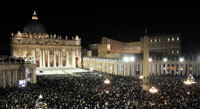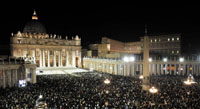
Pope John Paul dies, world grieves [Archives:2005/830/Front Page]
April 4 2005
 |
“Our beloved Holy Father John Paul has returned to the house of the Father,” said Archbishop Leonardo Sandri, announcing the death to a huge crowd that had massed under the Pontiff's windows to pray for a miraculous recovery that never came.
A wave of applause rippled through St Peter's Square, in an Italian sign of respect for the dead, and then hush descended. Many of the faithful wept uncontrollably.
The Pope died in his bed at 9:37 p.m. (1937 GMT), surrounded by the only family he had ) his closest Polish aides. Newspapers reported that his dying word was “Amen”.
As the news spread through Rome, thousands of faithful streamed to the Vatican to join those already there, paying homage to a man who revolutionised his office and took his rigorous message far beyond the confines of the Vatican.
John Paul's death triggered a rare outpouring of global grief, with people of all faiths and none praising his humanity, courage and moral integrity.
“We're grateful to God for sending such a man, a son of Poland, who became the bishop of Rome and a hero for the ages,” U.S. President George W. Bush said from the White House.
Around 130,000 people packed into St Peter's Square within two hours of his death, necks craned up towards the lighted windows of the Pope's apartments where he had just expired.
As day broke over the Polish Pope's adopted twin cities ) Rome and Vatican City ) the flow of pilgrims from afar began arriving in a fitting tribute to a Pontiff who travelled the equivalent of 30 times the circumference of the earth.
Tens of thousands were to attend a Requiem Mass for the Pope at 10.30 a.m. (0830 GMT) in the same cobblestoned square.
“POPE WHO CHANGED THE WORLD”
The city prepared extra trains, fresh water supplies and thousands of beds to accommodate one of the greatest influxes of pilgrims in its memory.
“We were at a party last night when we heard of the Pope's death,” said Erminia Palmieri as she arrived in Rome's main train station from an outlying town.
“Every one immediately stopped dancing. We went home and then decided to go to Rome. It's important to be close to him spiritually but also physically because he was great.”
“The Pope Who Changed the World”, “Goodbye Wojtyla”, “The Pope for All People” and “World Cries for the Pope” read headlines in the local press full of stories on Italy's adopted spiritual father.
The exact cause of death was not given but the Pope's health had deteriorated steadily over the past decade with the onset of Parkinson's Disease and arthritis.
He had an operation in February to ease serious breathing problems, but never regained his strength and last Thursday developed an infection and high fever that soon precipitated heart failure, kidney problems and ultimately death.
“We want to greet him one last time,” said Valentina Malafoglia, a 23-year-old student, as she arrived in Rome from the city Terni in central Italy.
LAST WORD
The Vatican announced that the Pope's body would lie in state for public viewing in St Peter's Basilica from Monday afternoon at the earliest. No date was set for a funeral, but it was likely to happen between Wednesday and Friday.
Many countries decreed periods of national mourning, with his native Poland announcing six days of mourning and Communist Cuba three days. Italy also called for three days of mourning.
The conclave to elect a new Pope will start in 15 to 20 days, with 117 cardinals from around the globe gathering in the Vatican's Sistine Chapel to choose a successor.
Many red-hatted princes of the Catholic Church had rushed to Rome in recent days to be near the Pope in his dying hours. Many others will arrive before the first General Congregation of the Cardinals gathers on Monday to decide on the funeral details.
There is no favourite candidate to succeed John Paul, with possible choices, or “papabili”, coming from around the world. The former Archbishop Karol Wojtyla of Krakow was himself a rank outsider when he was elevated to the papacy on Oct. 16, 1978.
In Poland bells rang out across the country and sirens wailed in the capital Warsaw as news of the death dashed any lingering hopes of a miraculous recovery.
Wojtyla, who saw his country occupied by the Nazis in his late teens, cut his teeth as a clergyman when Poland was run by atheist pro-Soviet communists after World War Two.
Apart from his battle against communism and quest for global peace, John Paul will also be remembered for his unswerving defence of traditional Vatican doctrines. He drew criticism from liberal Catholics who opposed his proclamations against contraception, abortion, married priests and women clergy.
GLOBETROTTER
The first non-Italian pope in 455 years, John Paul threw off the stiff trappings of the papacy, meeting ordinary people everywhere he travelled ) 129 countries and territories in all.
But as the years passed, his energy faded.
Once a lithe athlete and powerful speaker, he suffered a series of health dramas, including a near-fatal shooting by a Turkish gunman in 1981. By the end of his life he could no longer walk and his voice was often reduced to a raspy whisper.
Earlier this year, the breathing crises silenced the great communicator and he failed dramatically in two attempts to address the faithful last Easter Sunday and again on Wednesday.
The Vatican said the Pope had received the Catholic sacrament for the sick and dying, once called “Last Rites”.
Tributes poured in from around the world.
“The world has lost a religious leader who was revered across people of all faiths and none. He was an inspiration, a man of extraordinary faith, dignity and courage,” said British Prime Minister Tony Blair.
The Pope was an untiring advocate of Christian unity and inter-religious dialogue. He was the first Pontiff to preach in a Protestant church and a synagogue and to set foot in a mosque.
Some Catholics hope the next Pope will be more liberal.
But John Paul appointed all but two of the cardinals who will elect his successor, thus stacking the odds that his controversial teachings will not be tampered with.
——
[archive-e:830-v:13-y:2005-d:2005-04-04-p:front]


